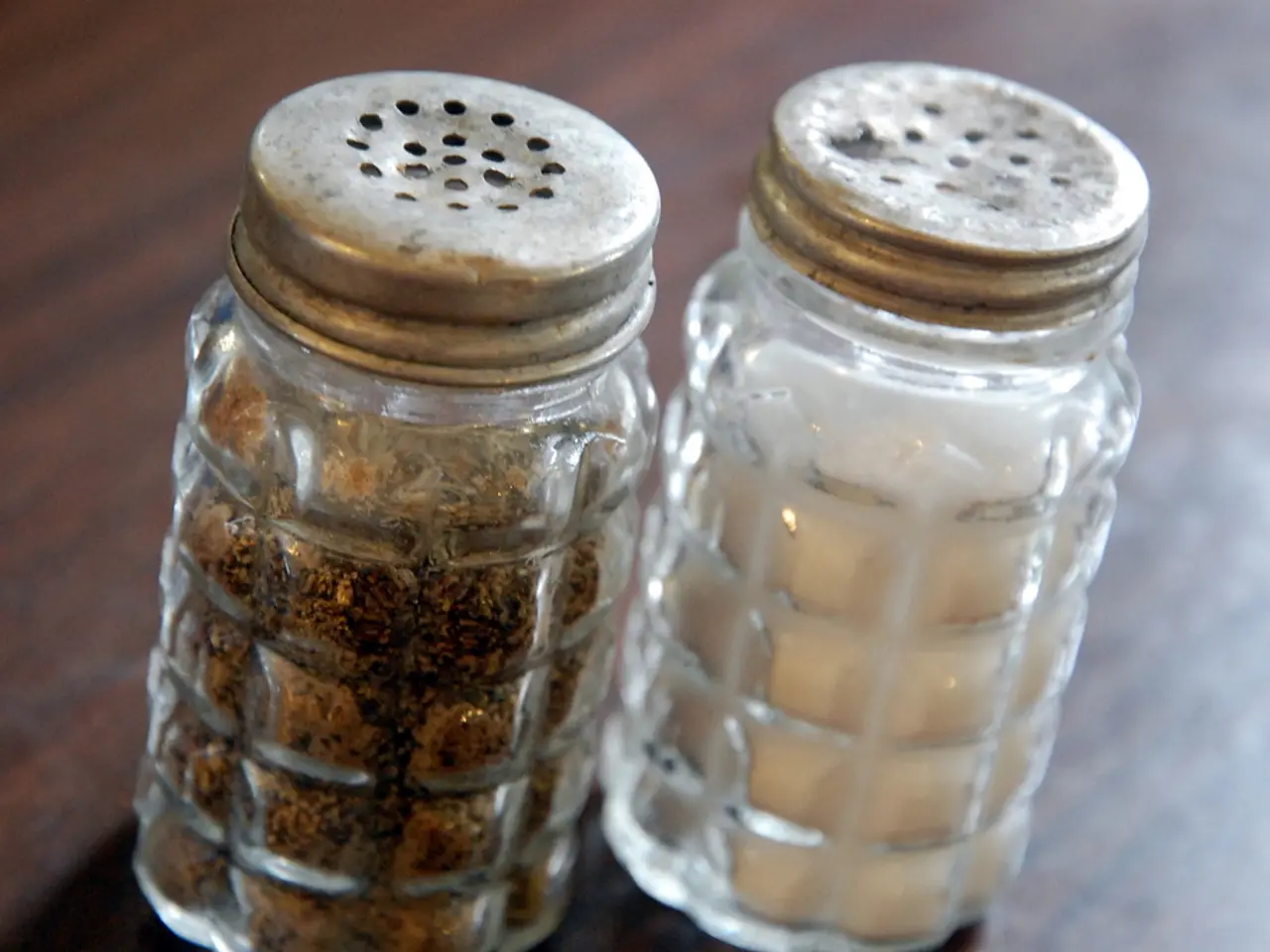Questioning the Healthfulness of Salt Substitutes as a Method for Reducing Salt Consumption
In the quest to maintain a balanced diet, many are turning to salt substitutes as an alternative to traditional salt for flavor. However, it's crucial to understand that these alternatives are not universally safe for everyone, particularly those with certain health conditions.
The American Heart Association recommends no more than 2,300 milligrams of sodium per day for most adults, with an ideal limit of 1,500 milligrams. Salt substitutes, which often replace sodium chloride with potassium chloride, can be beneficial for lowering blood pressure and reducing risks of heart attack, stroke, and chronic kidney disease in some people.
However, their safety varies significantly depending on individual health conditions. For instance, people with advanced or chronic kidney disease should be cautious with potassium-based salt substitutes as their kidneys may not effectively remove excess potassium. This can lead to dangerously high potassium levels (hyperkalemia), which can cause severe heart and muscle issues.
Similarly, those with heart disease, high blood pressure, liver disease, or diabetes should exercise caution when using these substitutes. Advanced liver disease can impair potassium regulation, raising the risk of hyperkalemia, while diabetes can sometimes impair kidney function or potassium handling.
For people with kidney disease, recommendations generally suggest limiting sodium intake below 2,000 mg per day to help reduce blood pressure and protect kidney function. This often necessitates reducing table salt intake and possibly using salt substitutes, but with careful monitoring due to potassium concerns.
It's important to note that the potassium in salt substitutes can raise the risk of high levels of potassium in your blood, which can be harmful. Moreover, using salt substitutes while on certain medications, such as ACE inhibitors and potassium-sparing diuretics, can raise your blood potassium to risky levels.
Starting with small amounts of salt substitute is advised. Over time, one can lose their taste for salt by exploring new herbs and spices. It's also worth mentioning that salt is hidden in many processed foods, especially those popular in America.
For those without these conditions, salt substitutes may be a helpful tool for managing blood pressure and cardiovascular risk. The Academy of Nutrition and Dietetics provides easy recipes for salt-free Mexican, Italian, and mixed herb seasoning blends, along with tips for eating right with less salt.
Using sodium-free baking powder can further decrease sodium in baking, and herbs, lemon juice, and flavored vinegars can be used as alternatives to salt for flavor. Remember, the right levels of sodium allow your muscles to contract and your nerves to fire, while optimal potassium levels are vital for normal functioning of the heart, muscles, and nerves.
In summary, while salt substitutes can help reduce sodium intake and lower blood pressure, they are not universally safe for people with kidney disease, liver disease, diabetes, or advanced heart conditions. Individuals with these conditions should always seek medical advice before using salt substitutes. For those without these conditions, such substitutes may be a helpful tool for managing blood pressure and cardiovascular risk.
- In the pursuit of a balanced diet, some opt for salt substitutes, yet understanding their safety for individuals with certain health conditions is essential.
- The American Heart Association recommends no more than 2,300 milligrams of sodium per day for most adults, with an ideal limit of 1,500 milligrams.
- Salt substitutes, which often replace sodium chloride with potassium chloride, can be beneficial for reducing risks of heart attacks, strokes, and chronic kidney disease in specific individuals.
- However, people with advanced or chronic kidney disease should use potassium-based salt substitutes with caution, as their kidneys may not effectively remove excess potassium.
- People with heart disease, high blood pressure, liver disease, or diabetes should also exercise caution when using these salt substitutes.
- For those with kidney disease, a sodium intake below 2,000 mg per day is often recommended to help protect kidney function.
- However, using salt substitutes in such cases requires careful monitoring to mitigate concerns related to potassium intake.
- The potassium in salt substitutes can raise the risk of high levels of potassium in one's blood, which can be harmful.
- Using salt substitutes while on certain medications, such as ACE inhibitors and potassium-sparing diuretics, can further increase blood potassium levels.
- Beginning with small amounts of salt substitute and exploring new herbs and spices is encouraged, as one can lose their taste for salt over time.
- Salt is hidden in many processed foods, especially popular in America, so it's important to be aware of this.
- For those without health conditions mentioned, salt substitutes may be a helpful tool for managing blood pressure and cardiovascular risk.
- The Academy of Nutrition and Dietetics provides easy recipes for salt-free seasoning blends and tips for eating right with less salt.
- Using sodium-free baking powder and alternatives like herbs, lemon juice, and flavored vinegars can also help reduce sodium in cooking and baking.
- Optimal sodium levels allow muscles to contract and nerves to fire, while optimal potassium levels are crucial for the normal functioning of the heart, muscles, and nerves.
- For individuals with health conditions mentioned, such as chronic kidney disease, liver disease, diabetes, or advanced heart conditions, seeking medical advice before using salt substitutes is always advisable.




